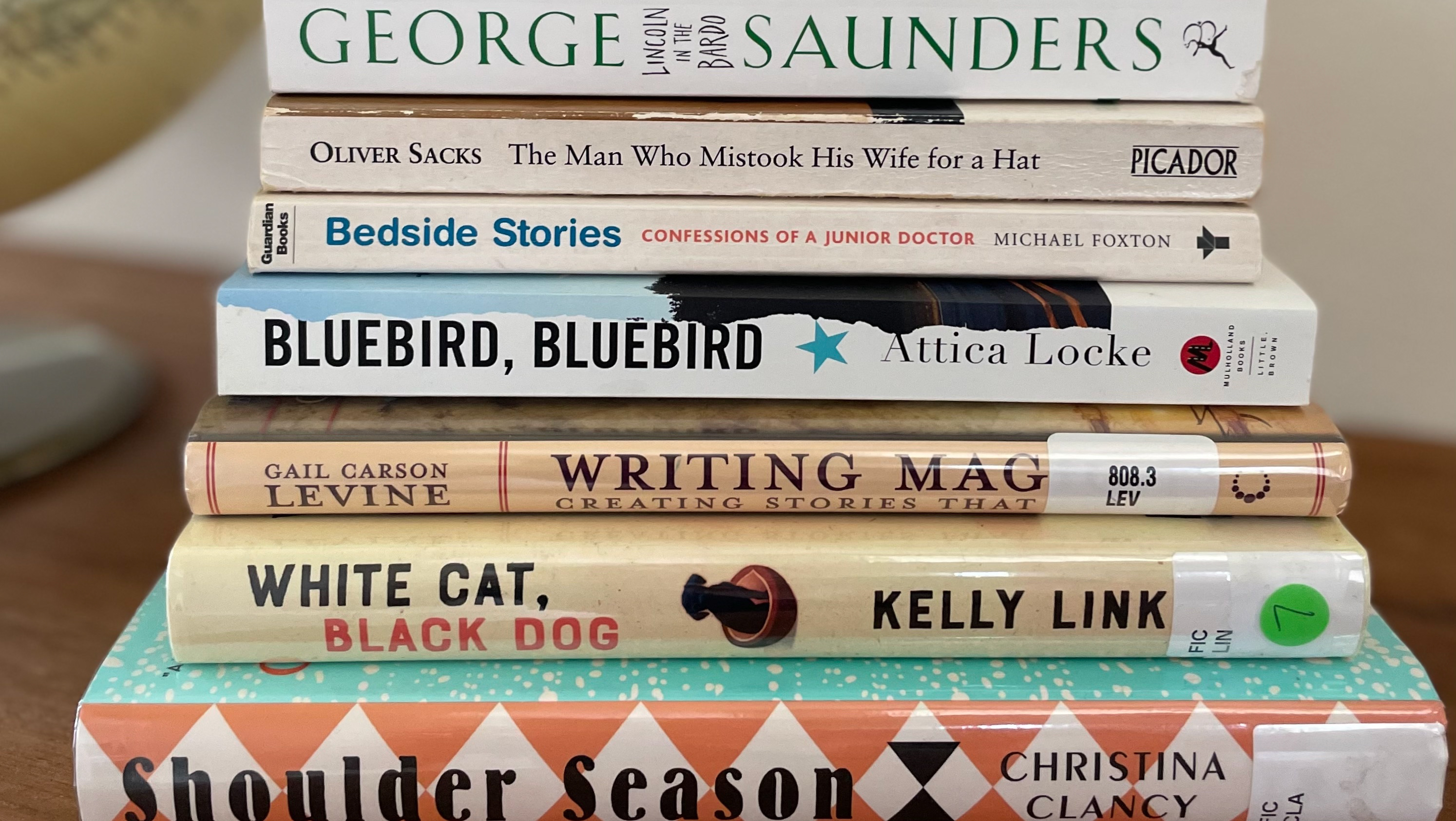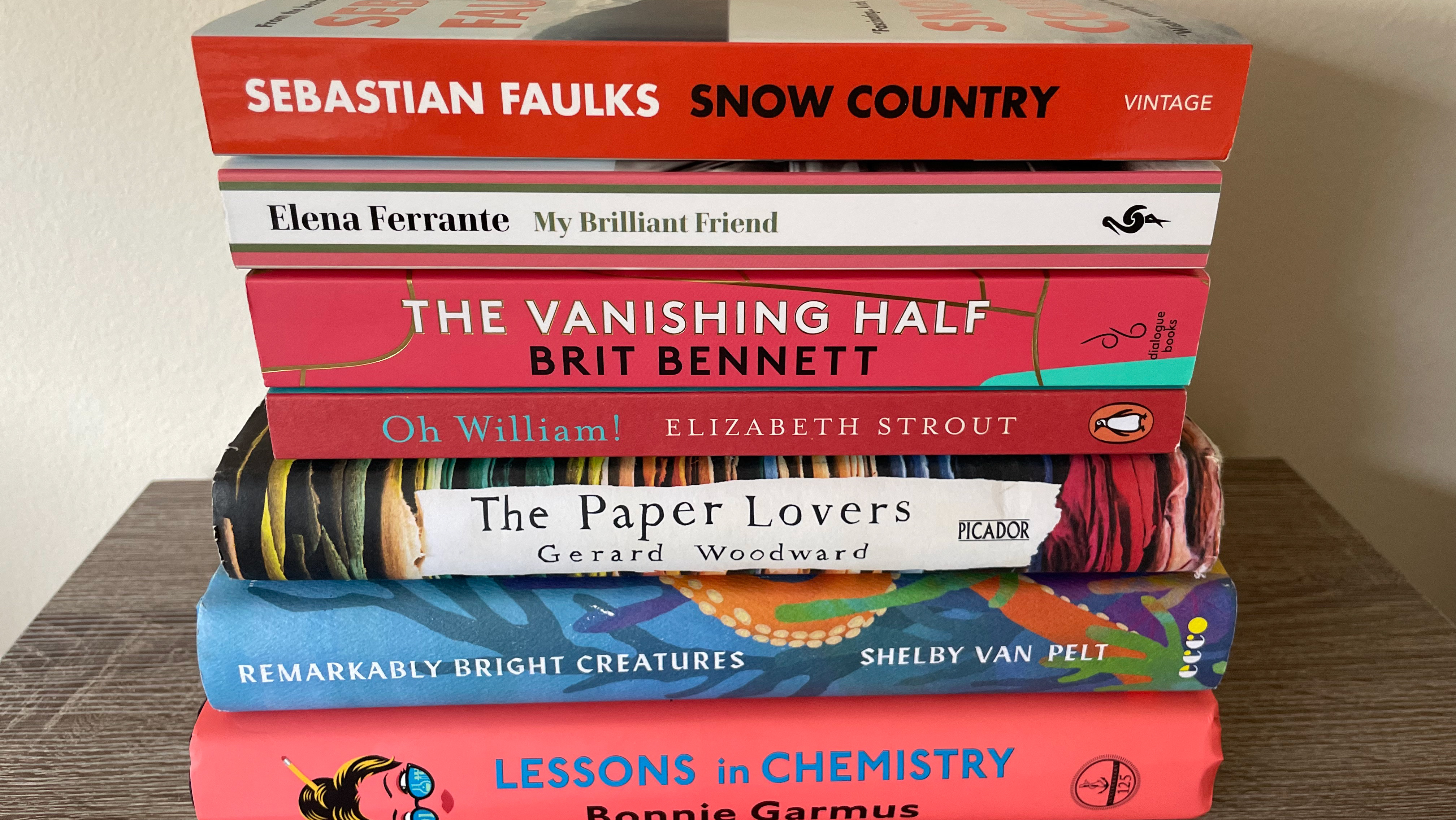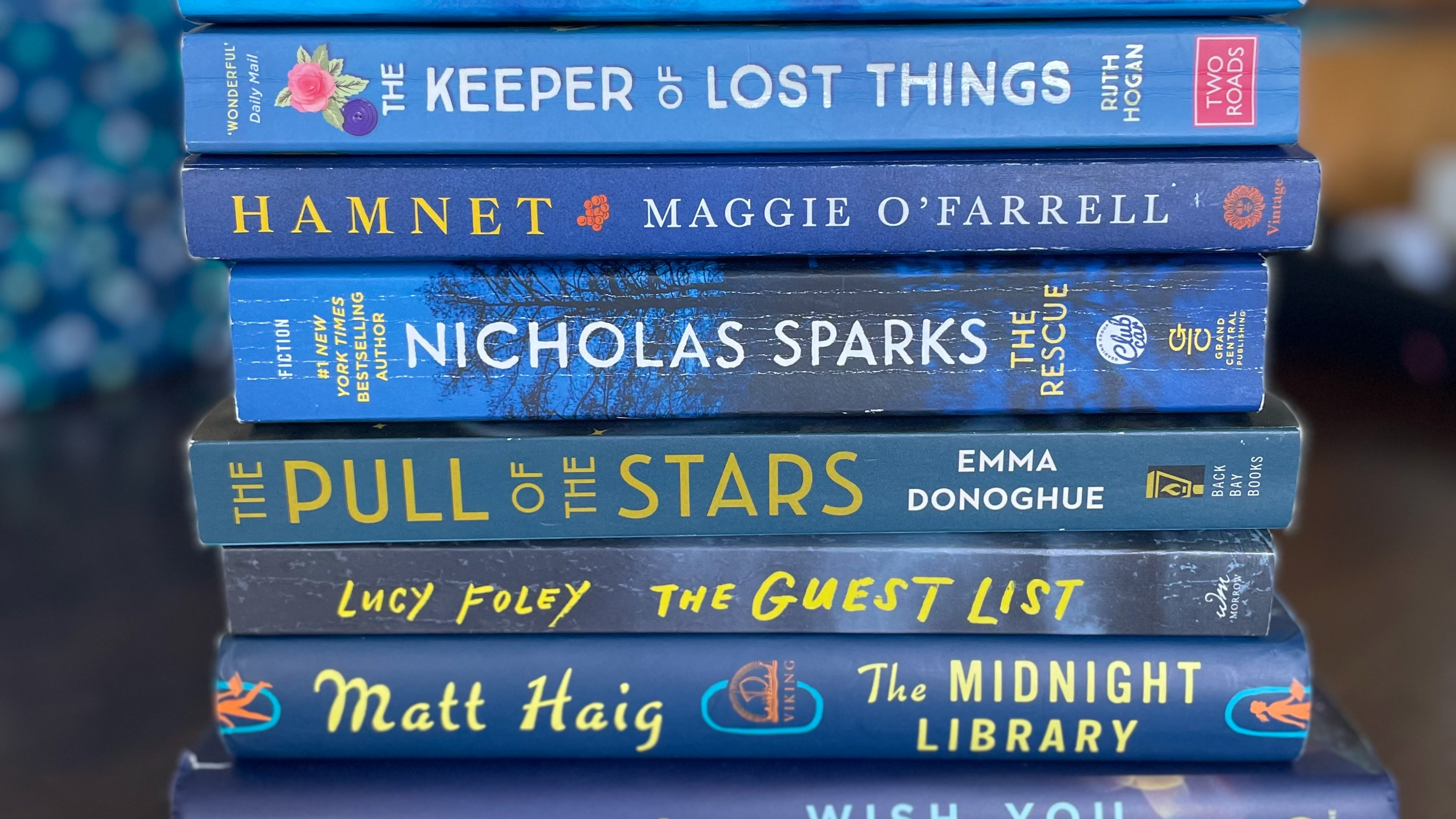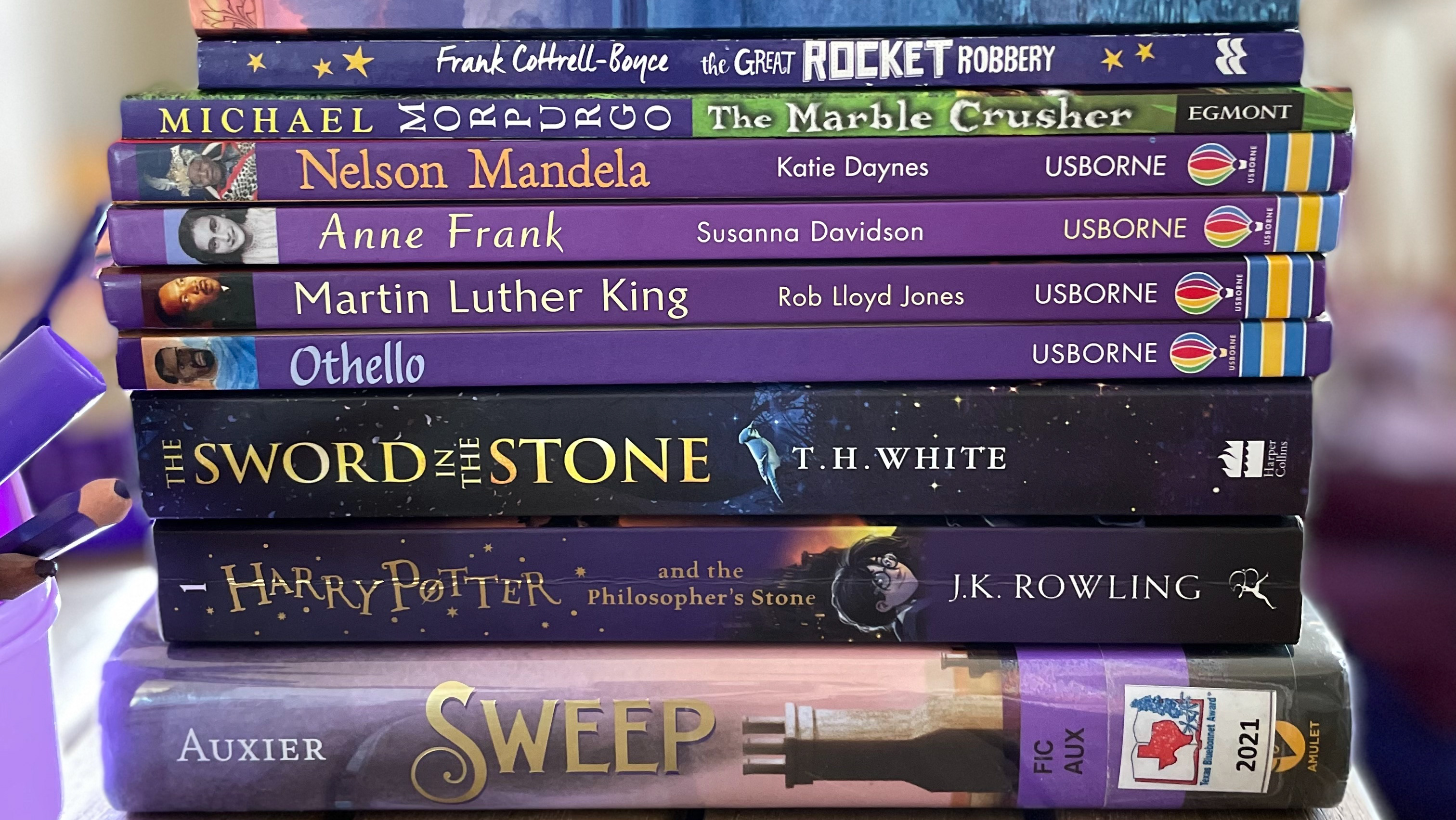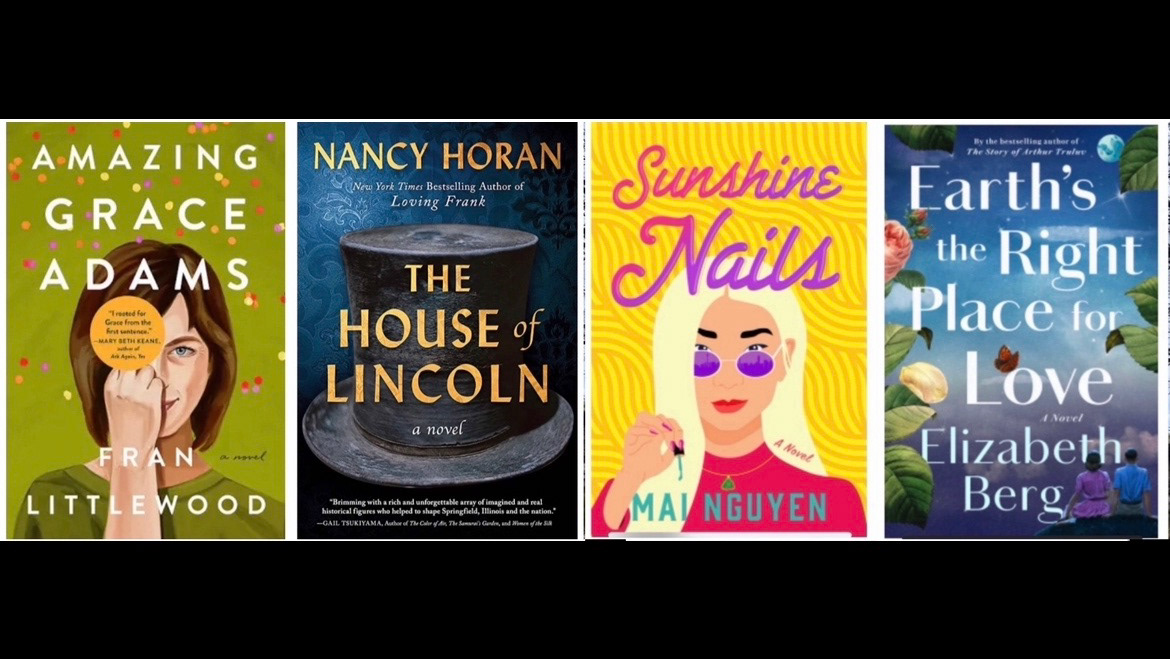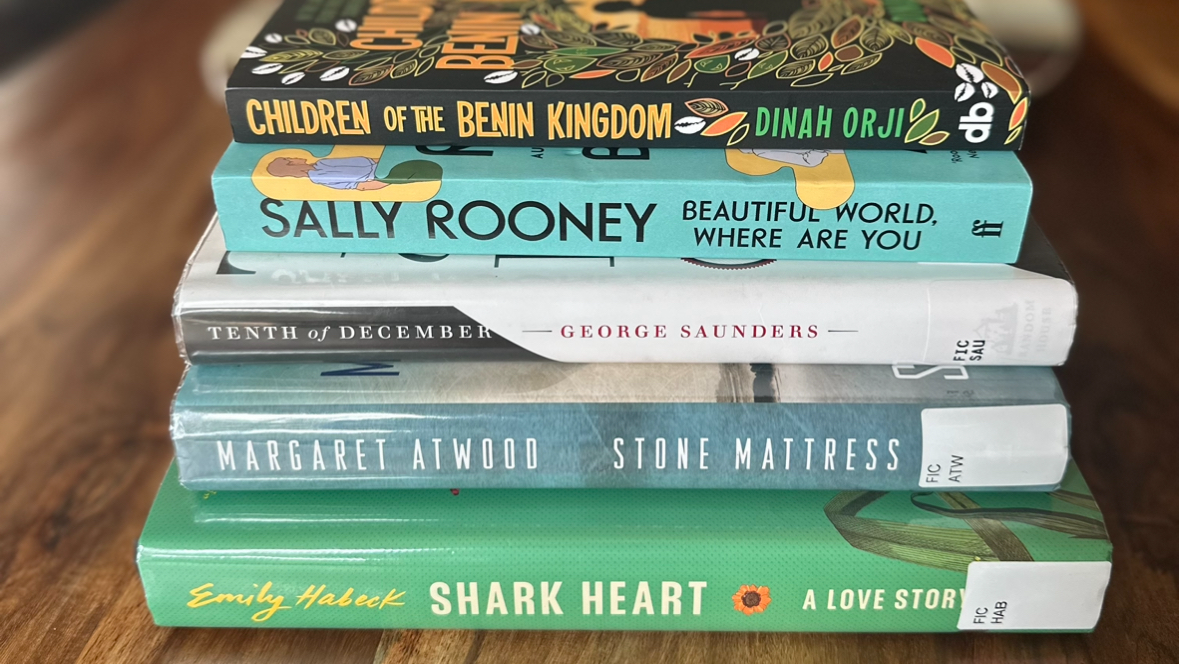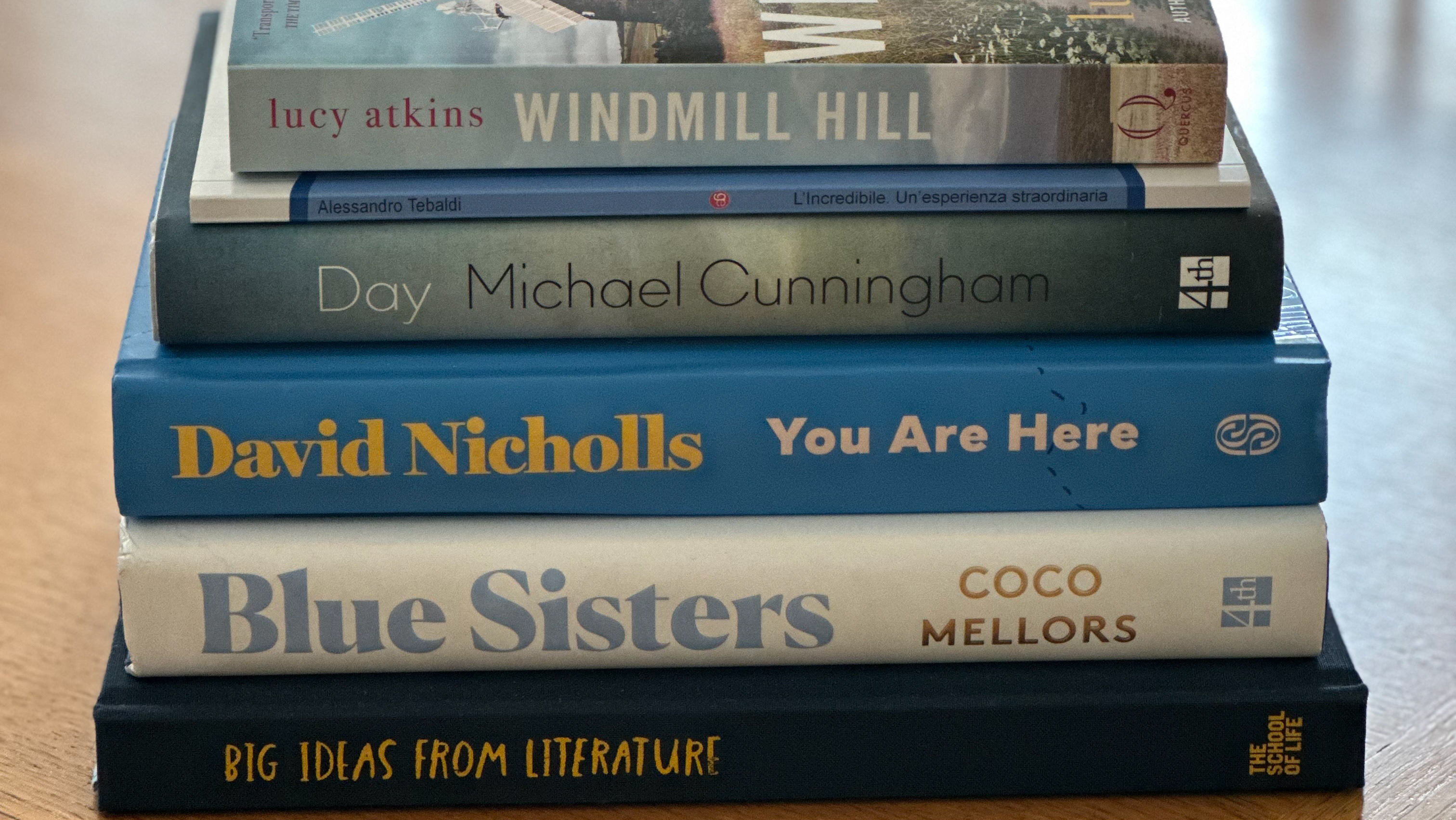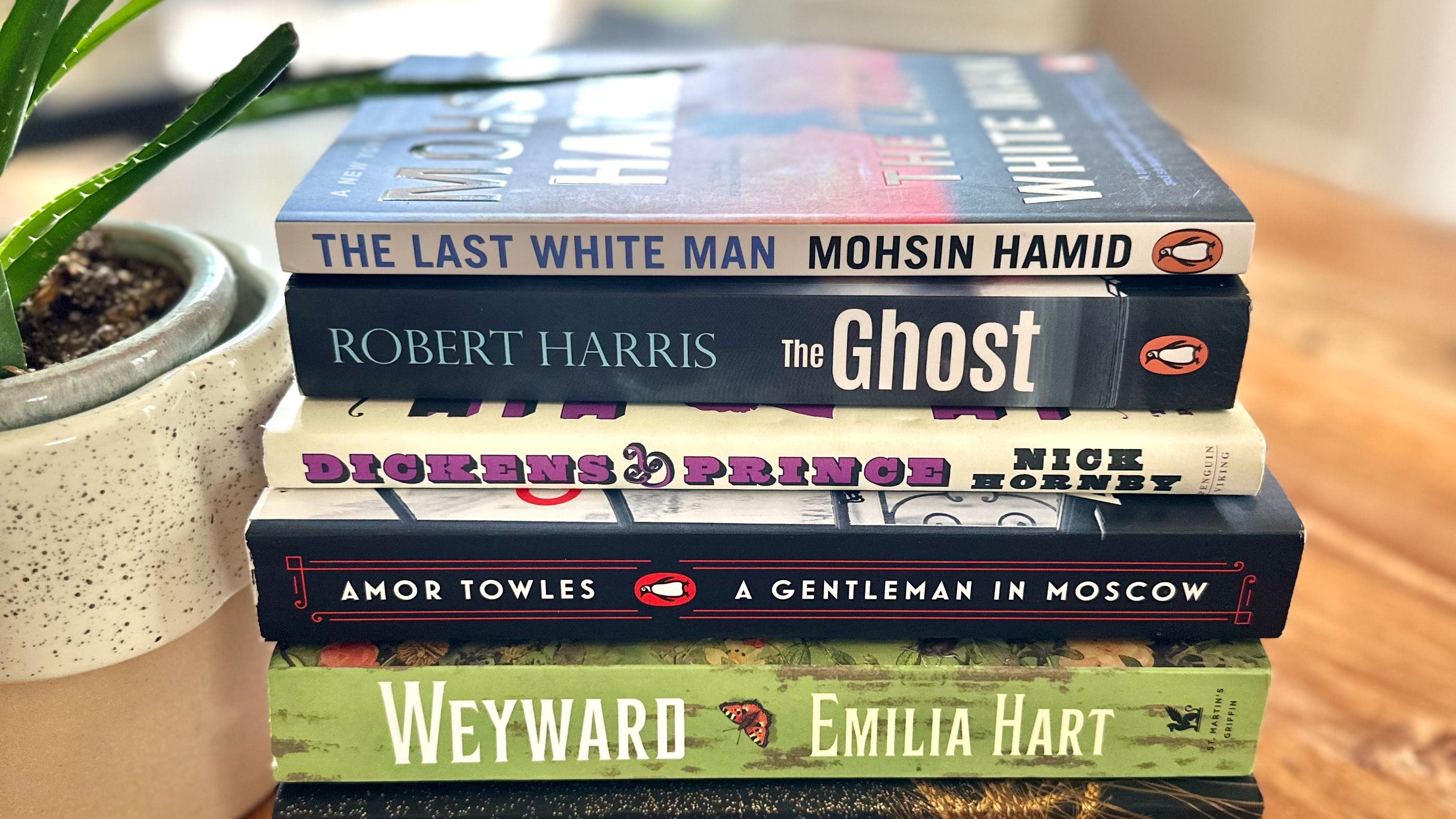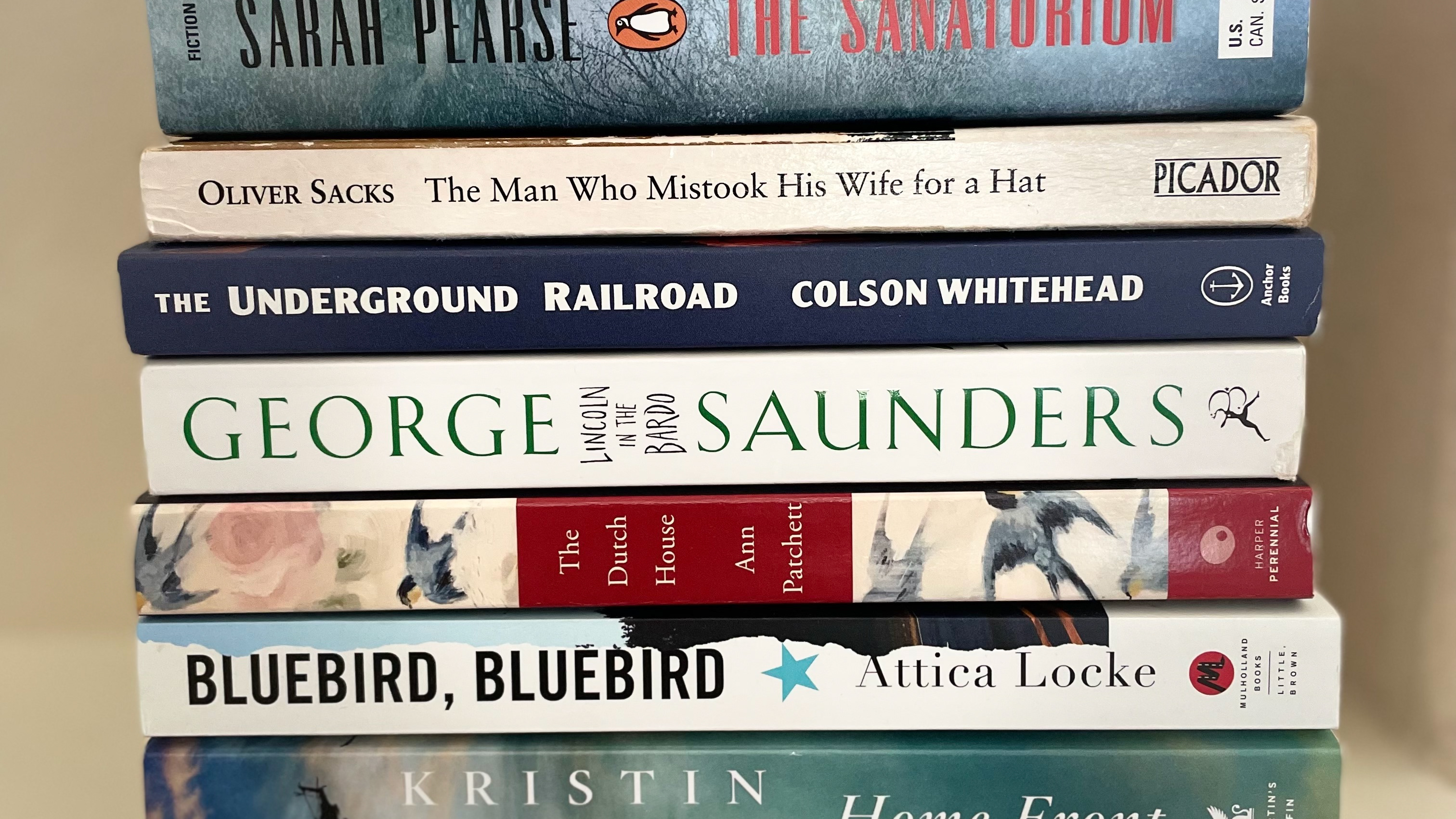Here's my next book pile May 2022 😊
Wish you Were Here by Jodi Picoult
Wasn't so sure as I started this novel whether it would be as gripping and controversially charged as her other novels. I didn't think the style of Picoult's writing seemed up to scratch and her use of genre-specific tools kept me reading, but with a strange distance and uncertainty about what my final thoughts would be on the novel.
Then it all made sense and suddenly part way through my reading I connected with Picoult's intentions and understood all that she aimed to and has achieved in writing this into a novel, published in record time and with current issues and topics addressed. I read this in a few days. I've never been to the Galapagos, though have heard beautiful tales and descriptions of the place from my aunt who visited years ago. I enjoyed reading Picoult's explanation in her Author's Note about where her inspiration came from and how she had first seen a news article about someone trapped in Machu Picchu during Covid. Since I've been there, I can imagine why she wanted to use a location like this for her novel.
The themes of isolation, perception, surrealism, memory and the significance of family responsibility are dealt with in such an innovative manner here that I do really recommend this novel to all. Having made it through the last few years of the pandemic, with slightly different experiences, living in another part of the world, I found a lot of triggers in this writing which will keep me thinking. Picoult has made another clever journey into our minds, prompting so many discussion points and ways of seeing what life was, is and will become for us post-pandemic. She is skilled at unravelling and helping us see life's intricate layers.
I'm glad I have delayed reading this novel until now, a couple of years after the actual experience of having lived through the Covid-19 pandemic.
I fully appreciate why so many of the reviews are vague, indefinite and without a real indication of what readers thought of the novel as a whole. Intrigued? Go and read it!
"Everyone remembers where they were when ... the Twin Towers fell, and the last thing they did before the world shut down due to the Covid-19 pandemic." Jodi Picoult in her Author's Note for Wish You Were Here.
review by Christina Francis-Gilbert
Nine Perfect Strangers by Liane Moriarty
**spoiler alert**
Finished this book in three days! Haven’t done that in years.
Not a read which I particularly enjoyed for its literary prowess, but as a wannabe novelist myself I found so much of this novel to be of interest. Fittingly, this novel was an addictive experience in which I felt I had to be engaged right to the end! Liane Moriarty knows how to structure a novel with shorter chapters in the mid-section to keep readers fixed with her plot and characters’ journeys.
Whoah. The voice of one of the male characters in the central section of this novel spoke to me so directly In such a clear, reasonable way about an experience that is so misunderstood in life. Huge praise to Liane Moriarty for writing this sensitive issue into the novel.
Talking of sensitive issues, there is also a true and understandable discussion and reasoning why mindfulness is not as good as it has always been argued to be, at least for some. It can be utterly dangerous and debilitating for impulsive beings: ‘…he never thought things through. He never thought of the consequences of his actions. He lived in the moment, as you were meant to do. He practiced mindfulness. No yesterday. No tomorrow. Just now.’
Another incredible explanation of what grief really feels like. Coincidentally, I’ve come across this theme in many of my recent reads: Hamnet, The Secret Life of Bees. Without consciously planning it, I have ended up reading novels in succession with interesting intertextuality. Other links exist between these novels.
Wow, some real tear-Inducing moments too. Having fraternal brother-sister twins myself, I found moments of this novel quite harrowing. I connected with so many moments of the novel not only related to twin predicaments and relationships, but also to the themes of grief, motherhood, suicide and depression. A novel I am fearful to recommend but one I enjoyed against my initial will!
Whoah. The voice of one of the male characters in the central section of this novel spoke to me so directly In such a clear, reasonable way about an experience that is so misunderstood in life. Huge praise to Liane Moriarty for writing this sensitive issue into the novel.
Talking of sensitive issues, there is also a true and understandable discussion and reasoning why mindfulness is not as good as it has always been argued to be, at least for some. It can be utterly dangerous and debilitating for impulsive beings: ‘…he never thought things through. He never thought of the consequences of his actions. He lived in the moment, as you were meant to do. He practiced mindfulness. No yesterday. No tomorrow. Just now.’
Another incredible explanation of what grief really feels like. Coincidentally, I’ve come across this theme in many of my recent reads: Hamnet, The Secret Life of Bees. Without consciously planning it, I have ended up reading novels in succession with interesting intertextuality. Other links exist between these novels.
Wow, some real tear-Inducing moments too. Having fraternal brother-sister twins myself, I found moments of this novel quite harrowing. I connected with so many moments of the novel not only related to twin predicaments and relationships, but also to the themes of grief, motherhood, suicide and depression. A novel I am fearful to recommend but one I enjoyed against my initial will!
review by Christina Francis-Gilbert
Hamnet by Maggie O'Farrell
A book which carries its readers through grief and depression and family heartache in a miraculous authentic manner. I couldn’t help but shiver whilst reading the final section with descriptions of London and the drama on stage. The descriptions of Agnes’ emotions and experiences are brilliant and so well researched that they give a real insight to the time period the novel narrates.
The historical fiction-style of the story is very clever and the way we are focused on the protagonist of Hamnet from the opening chapters is effective at establishing his character in the story.
O’ Farrell is one of my favourite authors and this novel impresses me with her movement towards the genre of historical fiction. Even her word choices and syntax patterns match the period about which she writes. It is nothing like other historical fiction novels, using a truly original approach which I love.
The historical fiction-style of the story is very clever and the way we are focused on the protagonist of Hamnet from the opening chapters is effective at establishing his character in the story.
O’ Farrell is one of my favourite authors and this novel impresses me with her movement towards the genre of historical fiction. Even her word choices and syntax patterns match the period about which she writes. It is nothing like other historical fiction novels, using a truly original approach which I love.
review by Christina Francis-Gilbert
Everything I Never Told You by Celeste Ng
This novel had a strange unsettling effect on me as a reader! I was aware of the way the narrative switches between characters in presenting the story and the details surrounding the character of Lydia, who is stated to be dead from the first line. I wonder whether the author had hoped to make the reader feel unstable by giving us the story from a real collaborative mixed narration of thoughts and emotions on events. If so, clever!
I enjoyed the structure of the novel with its development of backstory in a steady and interesting way. I loved the character of Hannah and of course this must have been Ng's intention, since later in the plot, she is the strong character who pulls us through to the end of the novel.
It is such a sad story though and midway through I couldn't help but feel emotionally drained by what was being fed to me through the vulnerable characters of Marilyn and James in their very foreign existences.
The ending works in concluding the story, yet leaving the reader a little upset by what they've heard regarding the family who are unfairly discriminated against, their desperation to fit in with 'normal' society and their avoidance of being different. Ultimately the parental role and how a parent is so instrumental in the development and upbringing of a child left me saddened but also motivated to understand how to communicate with children more effectively.
review by Christina Francis-Gilbert
The Secret Life of Bees by Sue Monk Kidd
Such a well-constructed and interesting read. I recognised some descriptions of North and South Carolina from having recently finished Denise Lewis’ novel, and the imagery and details to create the setting are beautiful in this novel.
The relationships between the characters were powerful and I saw great skill in the way Monk Kidd focused on emotions experienced by her characters based on various action points in the novel. The main character Lily Owens is a feisty teenage one and drives the reader to see this novel as a coming-of-age tale. The way that she struggles through her father T-Ray's abuse and survives in her escape is warming for the reader and we cannot help but empathise with her, in spite of the information given to us about her responsibility for her mother's death. It frustrates us as readers since it is a common happening and so harrowing for those innocents involved in these sort of incidents who have to live with their guilt.
I liked the character of May who had her own wall of emotion to cope with her grief since losing her twin sister, April. All of the females are role models, especially August who has some emotive parental relationships with Lily later in the novel. The character of Lily searches for a mother substitute and it is also a pleasing story to read of her settling among the Boatwright girls of the Honey house in Tumaron.
It was also an intriguing story because of its role in supporting the move to combat racism in rural South Carolina in 1964. The references to the 'Black Mary' and the character of Rosaleen being able to vote, as well as her maltreatment and discrimination by racist white men in the novel were strong and effective. We are completely absorbed into this wonderful household of honey-making.
I liked the quotations about honey and bees at the beginning of each chapter, adding a lovely structure to the novel.
review by Christina Francis-Gilbert
Where the Crawdads Sing by Delia Owens
I loved so much of this book including the well-informed descriptions and insights into the marshland setting.
I enjoyed reading the plot with its chapters of various different lengths and the use of dates to switch between scenes. I understand why it’s been made into a film since it was written in a cinematic, visually rich manner, which I liked.
I found myself frustrated by the inconsistencies in the narrative though. There seemed to be a lot of what I now know to be ‘head-hopping’ in that we receive the main character Kya’s perspective on something, immediately followed (far too closely) by the viewpoint of the other character in the scene.
I enjoyed reading the plot with its chapters of various different lengths and the use of dates to switch between scenes. I understand why it’s been made into a film since it was written in a cinematic, visually rich manner, which I liked.
I found myself frustrated by the inconsistencies in the narrative though. There seemed to be a lot of what I now know to be ‘head-hopping’ in that we receive the main character Kya’s perspective on something, immediately followed (far too closely) by the viewpoint of the other character in the scene.
Also, the contextual and specific details added to make the scene descriptions more authentic or accurate didn’t quite work since there were many things I don’t believe she would have known, e.g. the Revlon nail varnish with its name, when she couldn’t read and many other branded details which worked to set the scene in its historical place, but didn’t work coming from the main protagonist’s narrative.
Nevertheless, a lovely gripping tale with a definite coming-of-age theme intertwined with the murder mystery genre style, which I’m certain is why this novel has done so well and been made into a film. I am looking forward to seeing the film.
Nevertheless, a lovely gripping tale with a definite coming-of-age theme intertwined with the murder mystery genre style, which I’m certain is why this novel has done so well and been made into a film. I am looking forward to seeing the film.
review by Christina Francis-Gilbert
Olive, Again by Elizabeth Strout
I do love Elizabeth Strout's style of writing. This second novel which is also written in short story chapters as Olive Kitteridge was. It offers experiences and thoughts about many characters who we've met in Strout's whole collection of fiction is packed to the brim with emotion. She really knows how to make external comment on social injustice, prejudice and the concept of stereotypes amongst other themes, as well as wealth and social class through narratives and dialogue from her characters. Olive Kitteridge is just one of her deep and extraordinary characters. I loved reading of Olive's slight shifts in attitude and the way she reminisced her previous actions and way of living with her previous husband Henry, for example. The relationships she continues to build with those living around and near her in this novel are wonderful. The way that Strout connected Isabelle from her Amy and Isabelle novel was great and I found their parallel characters and attitudes to be a happy addition to the text.
I'm also a fan of her description of her chosen location of Crosby and Shirley Falls in Maine. I think the way she draws in the seasons and uses these different types of weather as tools to set the scene and emotion of her scenes works so well.
And finally, the extremely subtle and dark humour is lovely. The character of Olive Kitteridge truly is unforgettable. Packed full with honesty and acute observations of people she meets and with whom she shares her life, Elizabeth Strout's Olive can't help but be loved.
"Love, loss, regret, the complexities of marriage, the passing of time, and the astonishing beauty of the natural world are abiding themes ... unmissable." - Booklist (starred review)
review by Christina Francis-Gilbert
Outline by Rachel Cusk
An interesting structure, with a narrator relaying events and experiences from the stories told to her by an unknown acquaintance on an airline flight.
Thus, the narrative includes lengthy chapters which jump between the narrator’s thoughts on what her neighbour is telling her, his indirect speech linked with a selfish lifestyle and tales with dialogue linked to both scenarios.
The character, through whose perspective these stories is told does not ask the narrator any questions about her own life. He is not a likeable character. We feel distanced from him.
The final chapter was probably the most interesting for me, using the concept of ‘summing up’ as being a problem that has stunted the narrator’s writing capability (as a writer) since all that she knows, sees, experiences, wants to write about can be summed up in singular words. The author seems to be commenting on the frustration of literature and of indulging in something you love, since once you are involved in it, it usually then loses its splendour and significance, ruining its wonder for you.
I did enjoy the moments of clarity throughout with most interesting observations on life, the act of writing, living abroad, family and experiences.
Thus, the narrative includes lengthy chapters which jump between the narrator’s thoughts on what her neighbour is telling her, his indirect speech linked with a selfish lifestyle and tales with dialogue linked to both scenarios.
The character, through whose perspective these stories is told does not ask the narrator any questions about her own life. He is not a likeable character. We feel distanced from him.
The final chapter was probably the most interesting for me, using the concept of ‘summing up’ as being a problem that has stunted the narrator’s writing capability (as a writer) since all that she knows, sees, experiences, wants to write about can be summed up in singular words. The author seems to be commenting on the frustration of literature and of indulging in something you love, since once you are involved in it, it usually then loses its splendour and significance, ruining its wonder for you.
I did enjoy the moments of clarity throughout with most interesting observations on life, the act of writing, living abroad, family and experiences.
review by Christina Francis-Gilbert
The Mission House by Carys Davies
A calm, almost hypnotic read with an eclectic mix of main characters. I found the merging points of view hard to follow in places since the narrative hops between characters as they experience the scenes together. Sometimes the chapter divisions matched the change in point of view. At times chapters opened without immediately making known whose perspective it was.
I enjoyed the description and insight into what an Indian hill station was like in different pre and post colonial circumstances.
In fact the ideas which are presented in fragmented opposition are provocative but sensitively engaging and informative manner.
I enjoyed the description and insight into what an Indian hill station was like in different pre and post colonial circumstances.
In fact the ideas which are presented in fragmented opposition are provocative but sensitively engaging and informative manner.
review by Christina Francis-Gilbert
Educated by Tara Westover
I found this memoir to be exactly as all of the reviews have claimed previously: ‘heartbreaking’, ‘honest’, ‘incredible’, ‘remarkable’ and much more.
There were moments when I felt so tired by her recollection and narration of her childhood experiences. I hated to hear of the fear she has had and continues to have for her father, her brother and ultimately her life. I wanted her to have more help from her mother and to be able to speak out against her sisters’ and mother’s harsh treatment. I felt exasperated when understanding that there must be so many poor children as well as adults in the world (the USA) who have had so few choices of their own in life.
The feeling of not being able to escape really affected me. It’s difficult and perhaps offensive to talk of ignorance versus educated intelligence, but there is a reason why schooling is compulsory for young people in many parts (sadly and controversially), not all of the world.
I only knew a little about Mormonism before reading this and I am keen to read up more of the history surrounding Mormonism but this memoir has allowed me to build, perhaps confirm some of the suspicions I might have had about it. In fact, I wonder if Dr Westover’s dissertation is available to read!
Her PhD topic, which was mentioned in this memoir as aiming to examine: ‘…Mormonism not just as a religious movement, but as an intellectual one,’ looking at areas such as: ‘polygamy, not as a doctrine but as a social policy’ seems such an interesting focus for research.
My empathy for the author was profound in the later chapters, when she was cut off from her family, when she doubted her own memories, repeating to herself in one chapter ‘When life itself seems lunatic, who knows where madness lies?’ as her mantra.
The moment when I teared up and wanted her to finally feel happiness and safety in a more ‘real’ world was in the Strangers and Pilgrims chapter, when her brother Tyler finally chose his sibling relationship over his father’s unlike her other siblings who had known of and experienced their harsh childhood treatment, but hadn’t been able to break free, calling her a liar, affected by the Devil. For Tyler, Tara Westover felt she had to ask herself ‘How do you thank a brother who refused to let you go, who seized your hand and wrenched you upward, just as you had decided to stop kicking and sink?’
I recommend this memoir. It is an emotional read, ‘an astonishing account of deprivation, confusion, survival, and success.’ (Kirkus Reviews)
There were moments when I felt so tired by her recollection and narration of her childhood experiences. I hated to hear of the fear she has had and continues to have for her father, her brother and ultimately her life. I wanted her to have more help from her mother and to be able to speak out against her sisters’ and mother’s harsh treatment. I felt exasperated when understanding that there must be so many poor children as well as adults in the world (the USA) who have had so few choices of their own in life.
The feeling of not being able to escape really affected me. It’s difficult and perhaps offensive to talk of ignorance versus educated intelligence, but there is a reason why schooling is compulsory for young people in many parts (sadly and controversially), not all of the world.
I only knew a little about Mormonism before reading this and I am keen to read up more of the history surrounding Mormonism but this memoir has allowed me to build, perhaps confirm some of the suspicions I might have had about it. In fact, I wonder if Dr Westover’s dissertation is available to read!
Her PhD topic, which was mentioned in this memoir as aiming to examine: ‘…Mormonism not just as a religious movement, but as an intellectual one,’ looking at areas such as: ‘polygamy, not as a doctrine but as a social policy’ seems such an interesting focus for research.
My empathy for the author was profound in the later chapters, when she was cut off from her family, when she doubted her own memories, repeating to herself in one chapter ‘When life itself seems lunatic, who knows where madness lies?’ as her mantra.
The moment when I teared up and wanted her to finally feel happiness and safety in a more ‘real’ world was in the Strangers and Pilgrims chapter, when her brother Tyler finally chose his sibling relationship over his father’s unlike her other siblings who had known of and experienced their harsh childhood treatment, but hadn’t been able to break free, calling her a liar, affected by the Devil. For Tyler, Tara Westover felt she had to ask herself ‘How do you thank a brother who refused to let you go, who seized your hand and wrenched you upward, just as you had decided to stop kicking and sink?’
I recommend this memoir. It is an emotional read, ‘an astonishing account of deprivation, confusion, survival, and success.’ (Kirkus Reviews)
review by Christina Francis-Gilbert
The Reluctant Fundamentalist by Mohsin Hamid
I enjoyed the metafictional style of this novel, with the 2nd person narrator switching between his immediate surroundings and his nostalgic memories, as well as the frame story structure, focusing on the outdoor restaurant in the market district of Lahore. For me, it echoed of Italy Calvino’s If on a Winter’s night a Traveller, whose 2nd person metafictional narrative has always fascinated me.
As a setting, I think Hamid wrote well to bring senses to the reader and I felt able to switch my perspective to match the Pakistani character of Changez in his hometown and the American foreigner’s observations.
As a setting, I think Hamid wrote well to bring senses to the reader and I felt able to switch my perspective to match the Pakistani character of Changez in his hometown and the American foreigner’s observations.
Even more interesting though was acknowledging that the American character was not proffered a voice. It led us, as readers to empathise frustrating experiences of Muslims, hounded by inaccurate sweeping stereotypes in recent years. The anonymous American character’s actions and words are presented through Changez’s perceived viewpoint. This opened up extra levels of interpretation of his memories, reliability, authenticity of comments on their experience in the Lahore restaurant.
As intended by the author, my reading led me to alternate my opinion of Changez, at times understanding his perspective, but at others feeling distinctively western (in a negative sense) in my thoughts.
The character of Erica scared me a little with her vulnerability, since it seemed so familiar in the way she was so affected by emotional nostalgia. Without realising it, I expect that most people in many parts of the world feel this to some degree, following global conflicts and events, even the covid experience, like the one used in the novel. Erica also reminded me of the main female victim in The Vegetarian, linked with food disorders and an inability to cope with community, society and life.
A book which I definitely recommend as essential reading.
A very interesting article on the novel:
https://lithub.com/why-every-american...
The character of Erica scared me a little with her vulnerability, since it seemed so familiar in the way she was so affected by emotional nostalgia. Without realising it, I expect that most people in many parts of the world feel this to some degree, following global conflicts and events, even the covid experience, like the one used in the novel. Erica also reminded me of the main female victim in The Vegetarian, linked with food disorders and an inability to cope with community, society and life.
A book which I definitely recommend as essential reading.
A very interesting article on the novel:
https://lithub.com/why-every-american...
review by Christina Francis-Gilbert

